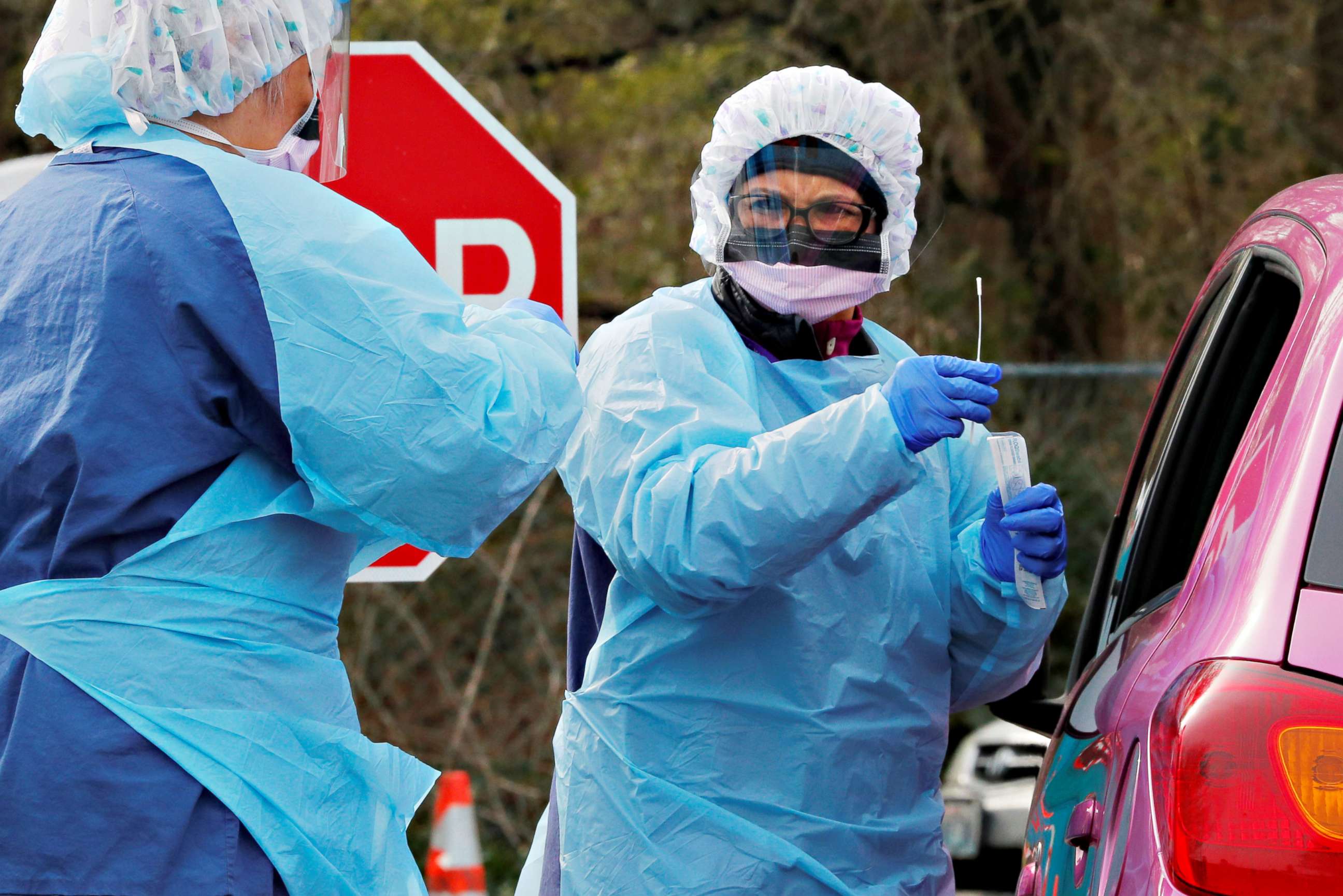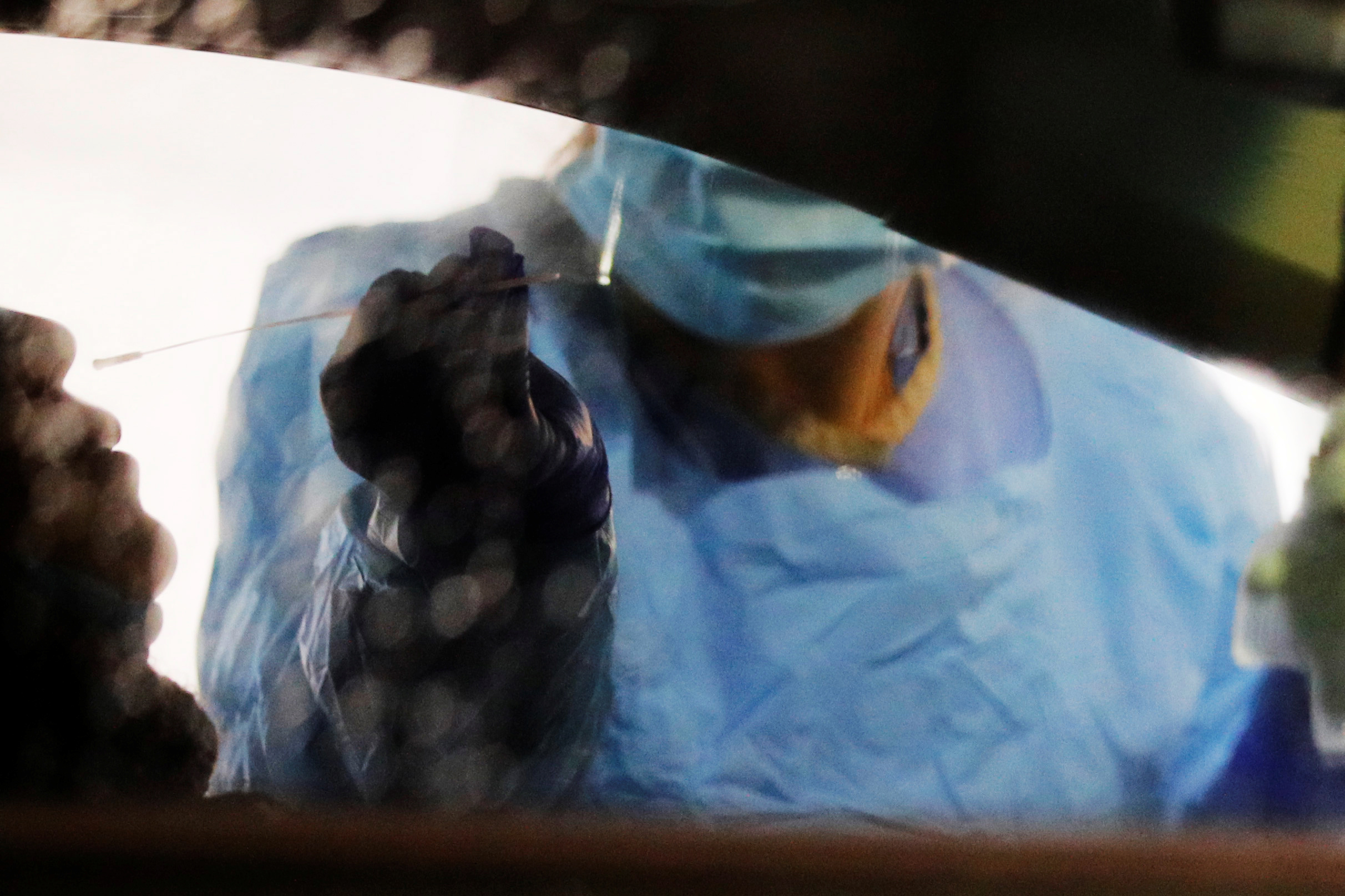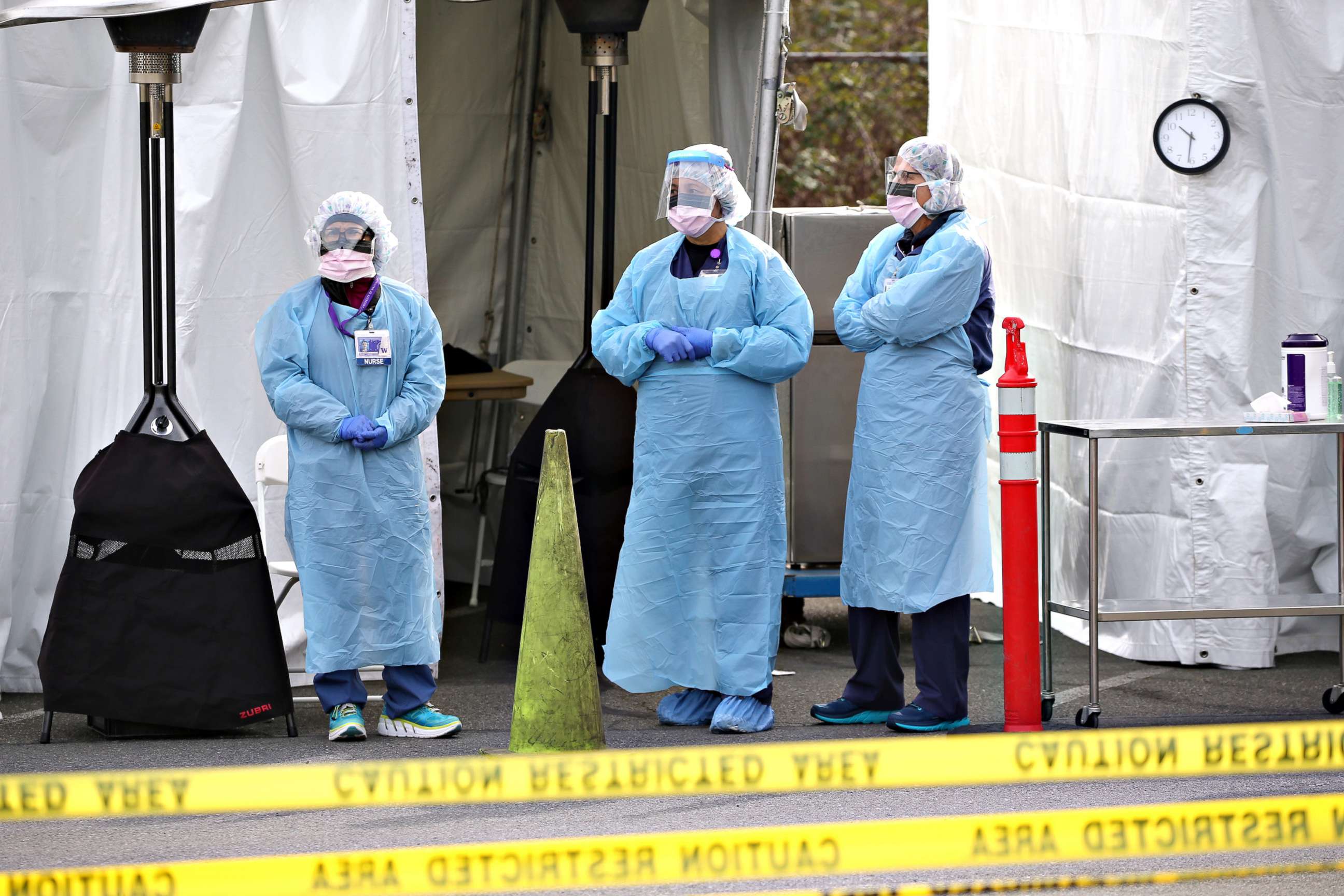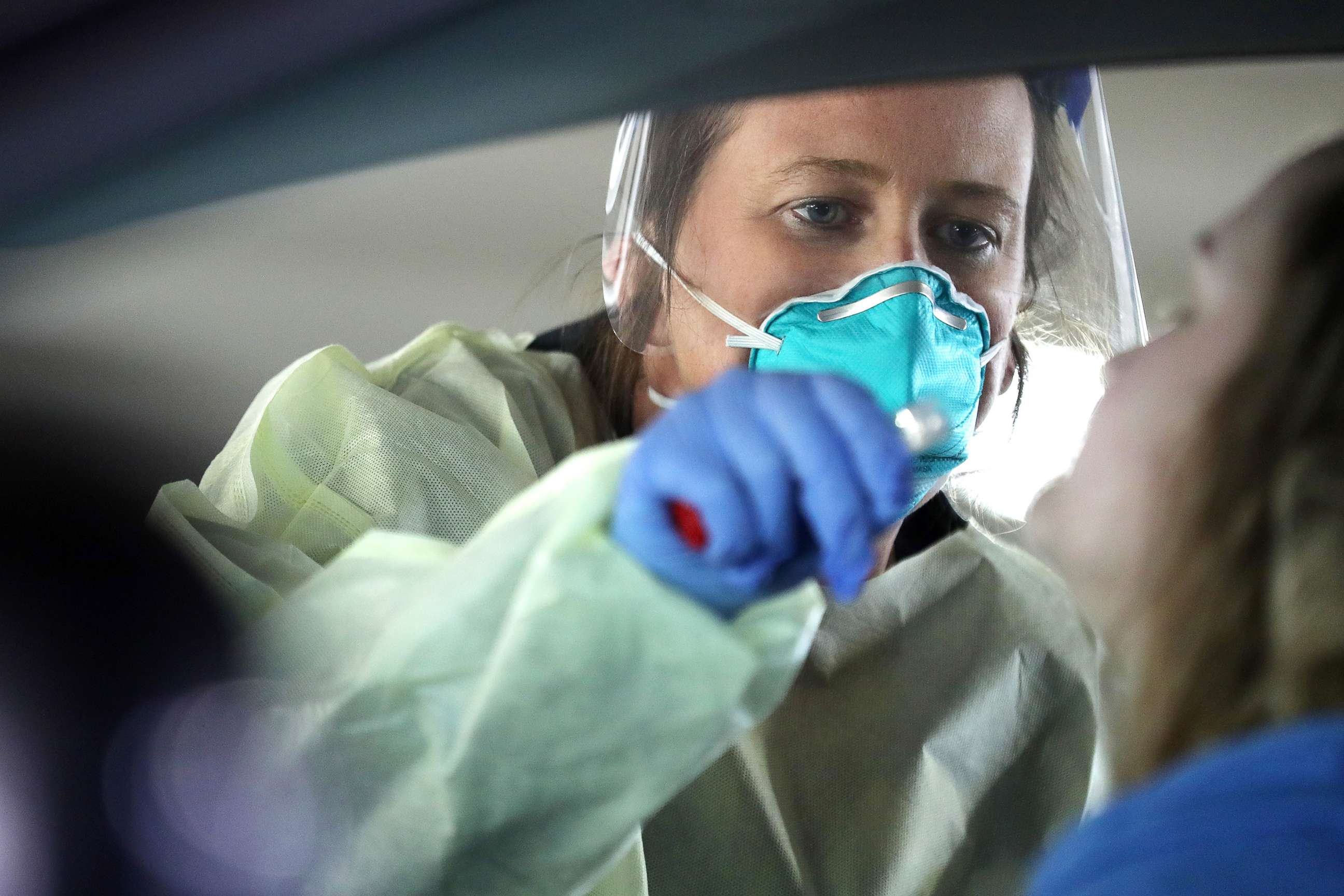Doctors say COVID-19 tests available, but some can't be administered due to mask shortage
The public-private testing partnership model leaves doctors unprotected.
Despite the public-private partnerships the White House touted Sunday as a solution to increasing the United States' coronavirus testing capacity, some doctors say they still aren't able to test their patients -- especially small private practices without the resources to keep personal protective equipment on hand.
The problem: Test kits are available, but some doctors lack the protective gear necessary to safely collect samples from their patients to send to the laboratories.
Dr. Anjali Viswanathan, an internal medicine doctor who sees patients in her outpatient practice, as well as at the New Jersey hospital where she works, wasn't able to get tests for her patients through the state health department or the hospital. But two testing companies, LabCorp and Quest Diagnostic, had test kits available with just a 72-hour turnaround for results.
There was just one catch. Viswanathan would have to provide the protective gear needed to procure the patient samples for the testing companies to analyze.
The test involves a deep nasal swab in which the doctor inserts the swab about three-quarters of the way into the nose and swirls it a couple of times in each nostril, Viswanathan explained.
"If someone sneezes on the staff performing the test, we will be exposed," Viswanathan said. When she's performed similar swabs in the past, to test for the flu, her patients sneezed roughly 75 percent of the time, she said.

According to guidelines from the Centers for Disease Control and Prevention, health care workers treating COVID-19 patients should wear gloves, gowns, a face-fitting N-95 mask, and either a face shield or eye protection like goggles that seal closely to the eye.
But while outpatient doctors are anxiously waiting to be able to test their patients, "my hospital-based friends haven’t had trouble getting the tests," Viswanathan said.
For the past week, Viswanathan has been able to secure testing through LabCorp and Quest Diagnostics, but has been unable to perform the swabs to actually get her patients tested. Her office only has one-size-fits-all masks, not the face-fitting N-95 masks that doctors are supposed to wear while performing the tests.
Viswanathan doesn't want to expose her staff to the virus without the proper protective gear on hand -- meaning they can't do any testing.
Viswanathan also hears similar complaints among outpatient doctors in the physician Facebook group she belongs to. Doctors in the group agree that it's too dangerous for them to perform the swabs without protection, and they're frustrated that no one -- neither private companies nor the government -- is providing them with the protective gear to stay safe while collecting COVID-19 samples, Viswanathan says.
Supplies of N-95 masks have grown so sparse that during a White House briefing Tuesday, Vice President Mike Pence urged construction companies, which use the same industrial masks to protect workers from inhaling dust and other debris, to donate them to their local hospitals and refrain from ordering more.
Is self-testing on the horizon, or is it a pipe dream?
As a workaround measure, Viswanathan is experimenting with having patients perform the swabs themselves. Her first trial run, scheduled to take place Wednesday evening, involves a man in his 50s who is exhibiting symptoms and who has been hospitalized with asthma in the past. The man will swab his own nose then immediately place the sample on ice, and Viswanathan plans to have a driver on standby to rush the sample to the lab for testing.

Even with that plan in place, Viswanathan has concerns that something could go wrong. "I'm hearing that the test is invalid unless handled the right way," she said.
On Wednesday, President Donald Trump announced that the government is working on its own self-swab test, which he said would make the testing process easier and expand capacity. Health experts are still determining whether self-testing is as effective as the physician-administered tests currently being run.
Coronavirus testing in the U.S. has been extremely limited compared to other countries, with 31,878 tests conducted by the Centers for Disease Control and Prevention and public health labs since the start of the outbreak, Assistant Secretary for Health Adm. Brett Giroir explained at a Tuesday press briefing.
In comparison, clinical labs, which are bearing the brunt of the protective gear testing gap that Viswanathan described, have run 27,000 tests, 8,000 of them on Monday alone.
Doctors with the capacity to collect patient samples, but who lack the protective gear to do so, therefore create an added wrinkle to those improved numbers.
For their part, commercial laboratories are representing themselves as middlemen, emphasizing that they solely analyze samples, rather than collect them, making an effort to distance themselves from any aspect of patient contact.
Quest Diagnostics told ABC News that samples must be collected by a health care provider and not a Quest employee, and LabCorp similarly told ABC News that the company is not collecting samples for its COVID-19 tests.
"It's fair, if that's their policy, but they also have a role in public health and in pandemic situations," Viswanathan said. "I think that they could do more."
'Sheer supply is short nationwide'
In the absence of help from the government and private companies, doctors find themselves rationing the supplies they have.
"It's particularly masks and the protective gear that we need desperately -- both to protect ourselves from patients but also patients from others," Dr. David Bell, a physician at Columbia University Irving Medical Center, told ABC News. "Sheer supply is short nationwide, so we're having to figure out new ways to protect ourselves and our patients."

In an effort to limit in-person contact, Bell's office has started screening people over the phone before having them visit the clinic. It's one of the ways that they are hoping to combat the gap in protective gear.
"It's gotten to the point where we have to take new measures to protect the people who are in our waiting rooms and everyone else, including our staff, because we don't have the proper gear," Bell said. "Converting to telephone-only visits -- that seems to be the only thing that will work because people aren't acknowledging that they need to stay home."
"Most people, except for those over 60, are OK and they're going to weather this like the cold or the flu," he added. "We do not need them flooding the clinics. This crisis is bringing in people, regardless of whether they are showing coronavirus symptoms or not."
Over the last few weeks, Bell said he's noticed more patients coming in with flu-like symptoms, common colds and minor infections. He said those people traditionally would normally "ride it out at home," but now they're coming in for treatment and putting others at risk.
"Panic surrounding coronavirus has put them on edge. It's bringing all these viruses into the clinic space and it's becoming contagious for anyone and everyone that's in the waiting room area," Bell said.

Especially with the protective gear shortage, Bell said it's best for people -- especially those with coronavirus symptoms -- to stay home unless they're over the age of 60 or have some sort of underlying illness.
"If they're under 60 and don't have any chronic illnesses, they should stay home. That's the best thing they can do for themselves and best they can do for everyone else," Bell said. "We don't need everyone flocking in to get tested. If you're not over 60 and don't need to get hospitalized, we're going to tell you the same thing: 'Stay home, don't go around the elderly and take care of yourself.'”
Physicians disagree about whether testing should be strictly limited to critical cases and health care workers, or expanded more widely.
Viswanathan, who falls into the latter group, questioned whether calls to narrow the testing criteria are a function of supply shortages rather than scientific evidence.
"From a public health perspective, everyone should be tested," she said. "That's the only way we'll know how many asymptomatic carriers there are."
What to know about the coronavirus:
- How it started and how to protect yourself: Coronavirus explained
- What to do if you have symptoms: Coronavirus symptoms
- Tracking the spread in the U.S. and worldwide: Coronavirus map
Tune into ABC at 1 p.m. ET and ABC News Live at 4 p.m. ET every weekday for special coverage of the novel coronavirus with the full ABC News team, including the latest news, context and analysis.
Alexandra Dukakis and Benjamin Gittleson contributed to this report.




